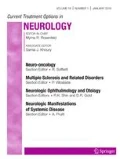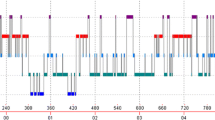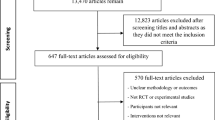Opinion statement
Headache has been linked to a wide range of sleep disorders that may impact headache management. There are no evidence-based guidelines, but the authors believe that literature supports the following clinical recommendations:
-
1.
Diagnose headache according to standardized criteria. Specific diagnoses are associated with increased risk for specific sleep and psychiatric disorders.
-
2.
Collect sleep history in relation to headache patterns. Screening questionnaires and prediction equations are cost-effective.
-
3.
Rule out sleep apnea headache in patients with awakening headache or higher-risk headache diagnoses (cluster, hypnic, chronic migraine, and chronic tension-type headache); patients with signs and symptoms of obstructive sleep apnea warrant polysomnography and treatment according to sleep medicine practice guidelines. There is no evidence for suspending conventional headache treatment in suspected or confirmed cases of sleep apnea. Treatment of sleep apnea with CPAP may improve or resolve headache in a subset of patients. The impact on sleep apnea headache of other treatments for sleep apnea (eg, oral appliances, surgery, weight loss) is largely untested. At a minimum, sedative-hypnotic drugs should be avoided in suspected apneics until the sleep apnea is treated.
-
4.
Among patients with migraine and tension-type headache, insomnia is the most common sleep complaint, reported by one half to two thirds of clinic patients. Patients who suffer from chronic migraine or tension-type headache may benefit from behavioral sleep modification. Pharmacologic treatment may be considered on a case-by-case basis, with hypnotics, anxiolytics, or sedating antidepressants used to manage insomnia, tailoring treatment to the symptom pattern.
-
5.
Individuals with chronic headache are at increased risk for psychiatric disorders. Assessment for depression and anxiety may be warranted when either insomnia or hypersomnia is present. Psychiatric symptoms affect the choice of sedating versus alerting versus neutral pharmacologic agents for headache.
-
6.
All headache patients, particularly those with episodic migraine and tension-type headaches, may benefit from inclusion of sleep variables in trigger management.


Similar content being viewed by others
References and Recommended Reading
Papers of particular interest, published recently, have been highlighted as: • Of importance ••Of major importance
Rains JC, Poceta JS, Penzien DB: Sleep and headaches. Curr Neurol Neurosci Rep 2008, 8:167–175.
Poceta JS, Rains JC: Sleep and headache syndromes. Sleep Med Clin 2008, 3(3):427–441. This paper provides a thorough literature review and detailed clinical recommendations to guide clinicians in screening for, diagnosing, and treating sleep-related headache.
Brennan KC, Charles A: Sleep and headaches. Semin Neurol 2009, 29(4):406–418. This paper provides a detailed description of the relationship between sleep and headache disorders and commonalities in pathophysiology.
Bigal ME, Lipton RB: Clinical course in migraine: conceptualizing migraine transformation. Neurology 2008, l 71(11):848–855.
Headache Classification Subcommittee of the International Headache Society: The International Classification of Headache Disorders, Second Edition. Cephalalgia 2004, 24(suppl 1):1–151.
Rains JC, Poceta JS: Headache and sleep disorders: review and clinical implications for headache management. Headache 2006, 46(9):1344–1361.
Alberti A, Mazzotta G, Gallinella E, et al.: Headache characteristics in obstructive sleep apnea and insomnia. Acta Neurol Scand 2005, 111:309–316.
Evers S, Goadsby PJ: Hypnic headache: clinical features, pathophysiology, and treatment. Neurology 2003, 60(6):905–909.
Calhoun AH, Ford S: Behavioral sleep modification may revert transformed migraine to episodic migraine. Headache 2007, 47(8):1178–1183. The paper reports findings from a randomized controlled trial of behavioral sleep intervention on headache outcome and describes a minimal sleep intervention useful for the headache practice setting.
Kelman L, Rains JC: Headache and sleep: examination of sleep patterns and complaints in a large clinical sample of migraineurs. Headache 2005. 45(7):904–910.
Martin PR, MacLeod C: Behavioral management of headache triggers: avoidance of triggers is an inadequate strategy. Clin Psychol Rev 2009, 29:483–495.
Houle TT, Rains JC, Penzien DB, et al.: Biobehavioral precipitants of headache: time-series analysis of stress and sleep on headache activity. Headache 2004, 44(5):533–534.
Wober C, Brannath W, Schmidt K, et al.: Prospective analysis of factors related to migraine attacks: the PAMINA study. Cephalalgia 2007, 27(4):304–314.
Provini F, Vetrugno R, Lugaresi E, et al.: Sleep-related breathing disorders and headache. Neurol Sci 2006, 27(Suppl 2):S149–S152.
Nobre ME, Leal AJ, Filho PM: Investigation into sleep disturbance of patients suffering from cluster headache. Cephalalgia 2005, 25(7):488–492.
Graff-Radford SB, Newman A: Obstructive sleep apnea and cluster headache. Headache 2004. 44(6):607–610.
Sand T, Hagen K, Schrader H: Sleep apnoea and chronic headache. Cephalalgia 2003, 23(2):90–95.
Mitsikostas DD, Vikelis M, Viskos A: Refractory chronic headache associated with obstructive sleep apnoea syndrome. Cephalalgia 2007, 28(2):139–143.
Calhoun AH, Ford S, Finkel AG, et al.: The prevalence and spectrum of sleep problems in women with transformed migraine. Headache 2006, 46(4):604–610.
Boardman HF, Thomas E, Millson DS, et al.: Psychological, sleep, lifestyle, and comorbid associations with headache. Headache 2005, 45(6):657–669.
Vgontzas A, Lihong C, Merikangas KR: Are sleep difficulties associated with migraine attributable to anxiety and depression? Headache 2008, 48(10):1451–1459.
d’Onofrio F, Bussone G, Cologno D, et al.: Restless legs syndrome and primary headaches: a clinical study. Neurol Sci 2008, 29(Suppl 1):S169–S172.
Barbanti P, Fabbrini G, Aurilia C, et al.: A case-control study on excessive daytime sleepiness in episodic migraine. Cephalalgia 2007, 27(10):1115–1119.
Ohayon MM: Prevalence and risk factors of morning headaches in the general population. Arch Intern Med 2004, 164(1):97–102.
Rains JC: Sleep and headache. In Assessment and Management of Headache: A Psychobiological Perspective. Edited by Penzien DB, Rains JC, Lipton RB, Maizels M. Washington, DC: American Psychological Association Books; in press.
Chervin RD, Zallek SN, Lin X, et al.: Sleep disordered breathing in patients with cluster headache. Neurology 2000, 54(12):2302–2306.
Flemons WW, Whitelaw WA, Brant R, et al.: Likelihood ratios for a sleep apnea clinical prediction rule. Am J Respir Crit Care Med 1994, 150(5 Pt 1):1279–1285.
Morgenthaler TI, Kapen S, Lee-Chiong T, et al.: Practice parameters for the medical therapy of obstructive sleep apnea. Sleep 2006, 29(8):1031–1035.
Morgenthaler T, Kramer M, Alessi C, et al.: Practice parameters for the psychological and behavioral treatment of insomnia: an update. An American Academy of Sleep Medicine report. Sleep 2006, 29(11):1415–1419.
Buscemi N, Vandermeer B, Friesen C, et al.: The efficacy and safety of drug treatments for chronic insomnia in adults: a meta-analysis of RCTs. J Gen Intern Med 2007, 22(9):1335–1350.
Baskin SM, Smitherman TA: Migraine and psychiatric disorders: comorbidities, mechanisms, and clinical applications. Neurol Sci 2009, 30(Suppl 1):S61–S65.
Griffith JL, Razavi M: Pharmacological management of mood and anxiety disorders in headache patients. Headache 2006, 46(Suppl 3):S133–S141.
Nath Zallek S, Chervin RD: Improvement in cluster headache after treatment for obstructive sleep apnea. Sleep Med 2000, 1(2):135–138.
Paiva T, Farinha A, Martins A, et al.: Chronic headaches and sleep disorders. Arch Intern Med 1997, 157(15):1701–1705.
Poceta JS, Dalessio DJ: Identification and treatment of sleep apnea in patients with chronic headache. Headache 1995, 35(10):586–589.
Kiely JL, Murphy M, McNicholas WT: Subjective efficacy of nasal CPAP therapy in obstructive sleep apnoea syndrome: a prospective controlled study. Eur Respir J 1999, 13(5):1086–1090.
Davis JA, Fine ED, Maniglia AJ: Uvulopalatopharyngoplasty for obstructive sleep apnea in adults: clinical correlation with polysomnographic results. Ear Nose Throat J 1993, 72(1):63–66.
Abad VC, Guilleminault C: Treatment options for obstructive sleep apnea. Curr Treat Options Neurol 2009, 11:358–367.
Peppard PE, Young T, Dempsey J, Skatrud J: Longitudinal study of moderate weight change and sleep-disordered breathing. JAMA 2000, 248:3015–3021.
Smith MT, Perlis ML, Park A, et al.: Comparative meta-analysis of pharmacotherapy and behavior therapy for persistent insomnia. Am J Psychiatry 2002, 159(1):5–11.
Schutte-Rodin S, Broch L, Buysse D, et al.: Clinical guideline for the evaluation and management of chronic insomnia in adults. J Clin Sleep Med 2008, 4(5):487–504. This paper provides a thorough review of chronic insomnia and evidence-based guidelines for its treatment.
Edinger JD, Sampson WS: A primary care “friendly” cognitive behavioral insomnia therapy. Sleep 2003, 2:177–182.
Rains JC: Optimizing circadian cycles and behavioral insomnia treatment in migraine. Curr Pain Headache Rep 2008, 12:213–219.
Cohen GL: Protriptyline, chronic tension-type headaches, and weight loss in women. Headache 1997, 37(7):433–436.
Feren S, Katyal A, Walsh JK: Efficacy of hypnotic medications and other medications used to treat insomnia. Sleep Med Clinics 2006, 1:387–397.
James SP, Mendelson WB: The use of trazodone as a hypnotic: a critical review. J Clin Psychiatry 2004, 65:752–755.
Rains JC, Penzien DB, McCrory DC, et al.: Behavioral headache treatment: history, review of the empirical literature, and methodological critique. Headache 2005, 45(Suppl 2):S92–S109.
Lipchik GL, Smitherman TA, Penzien DB, et al.: Basic principles and techniques of cognitive-behavioral therapies for comorbid psychiatric symptoms among headache patients. Headache 2006, 46(Suppl 3):S119–S132.
Nash JM, Park ER, Walker BB, et al.: Cognitive-behavioral group treatment for disabling headache. Curr Headache Rep 2003, 2:475–481.
Martin VT, Behbehani MM: Toward a rational understanding of migraine trigger factors. Med Clin North Am 2001, 85(4):911–941.
Disclosure
No potential conflicts of interest relevant to this article were reported.
Author information
Authors and Affiliations
Corresponding author
Rights and permissions
About this article
Cite this article
Rains, J.C., Poceta, J.S. Sleep and Headache. Curr Treat Options Neurol 12, 1–15 (2010). https://doi.org/10.1007/s11940-009-0056-y
Published:
Issue Date:
DOI: https://doi.org/10.1007/s11940-009-0056-y




